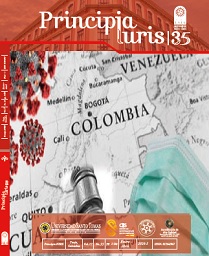La narración, una experiencia que potencia saberes: aportes a las directrices del decreto 2247 de septiembre 11 de 1997
Contenido principal del artículo
Resumen
Se aborda la narrativa como mediador para contar historias desde experiencias o anécdotas personales, donde la participación y el protagonismo son parte de los diferentes actores que viven y conviven alrededor de un maestro, así como el deseo de hablar, imaginar, recordar y desde luego expresarse como parte de una experiencia e intercambio de saberes que aportan nuevos conceptos a estas culturas y la configuración de saberes en común.
Detalles del artículo
Por medio de esta comunicación certifico que el artículo que estoy presentando para posible publicación en la revista institucional impulsada de la Facultad de Derecho de la Universidad Santo Tomás seccional Tunja, Principia Iuris, es de mi entera autoría, siendo sus contenidos producto de mi directa contribución intelectual.
Todos los datos y referencias a publicaciones hechas están debidamente identificados con su respectiva nota bibliográfica y en las citas que se destacan como tal.
Por todo lo anterior, declaro que el material presentado se encuentra conforme a la legislación aplicable en materia de propiedad intelectual, y por lo tanto, me hago responsable de cualquier reclamación relacionada a esta.
En caso de que el artículo presentado sea publicado, manifiesto que cedo plenamente a la Universidad Santo Tomás seccional Tunja los derechos de reproducción del mismo y accedo a las modificaciones que de forma se requieran para adaptarse a la estética de la revista. Como contraprestación de la presente cesión, declaro mi conformidad de recibir (2) ejemplares del número de la revista en que aparezca mi artículo.
Citas
Altet, M. (2005). La formación profesional del maestro: estrategias y competencias. En L. Paquay, M. Altet, É. Charlier y P. Perrenoud (Coords). La formación profesional del maestro: estrategias y competencias (pp. 33-48). México: Fondo de Cultura Económica.
Alzate Piedrahita, M. V. (2000). Cultura y pedagogía: una aproximación a Jerome Brunner. Revista de Ciencias Humanas, 7(24), 108-117.
Bruner, J. (2003). La fábrica de historias: derecho, literatura, vida. Buenos Aires: Fondo de Cultura Económica.
Caamaño, C. (2012). La narrativa en la enseñanza. Recuperado de http://www.camaradellibro.com.uy/wp-content/uploads/2012/03/ART%C3%8DCULO-Y-CONFERENCIA-LA-NARRACI%C3%93N-Y-LA-EDUCACI%C3%93N.pdf
Congreso de Colombia. (8 de febrero de 1994). Ley 115 de 1994: Ley general de educación. D. O. 41214.
Ezpeleta, J. (2005). Entre la gestión del cambio y el cambio de las prácticas. En G. Anderson y otros, Escuela: producción y democratización del conocimiento (pp. 25-40). Buenos Aires: Secretaría de Educación - GCBA.
Fundación Pedagógica Rayuela, (2006a). Cartografía. Tunja: El autor.
Fundación Pedagógica Rayuela, (2006b). Manual de convivencia. Tunja: El autor.
Gerrig, R. J. y Zimbardo, P. G. (2005). Psicología y vida (17a ed.). México: Pearson Educación.
Lomas, C. y Tusón, A. (2000). Textos de didáctica de la lengua y de la literatura: la narración. Barcelona: Graó.
Ministerio de Educación Nacional (MEN). (2013). Documento guía: evaluación de competencias docente preescolar.
Presidencia de la República de Colombia. (11 de septiembre de 1997). Decreto 2247 de 1997.
Suárez, D. (2011, abril). Relatos de experiencia, saber pedagógico y reconstrucción de la memoria escolar. Educação em Revista, 27(01), 387-416.

